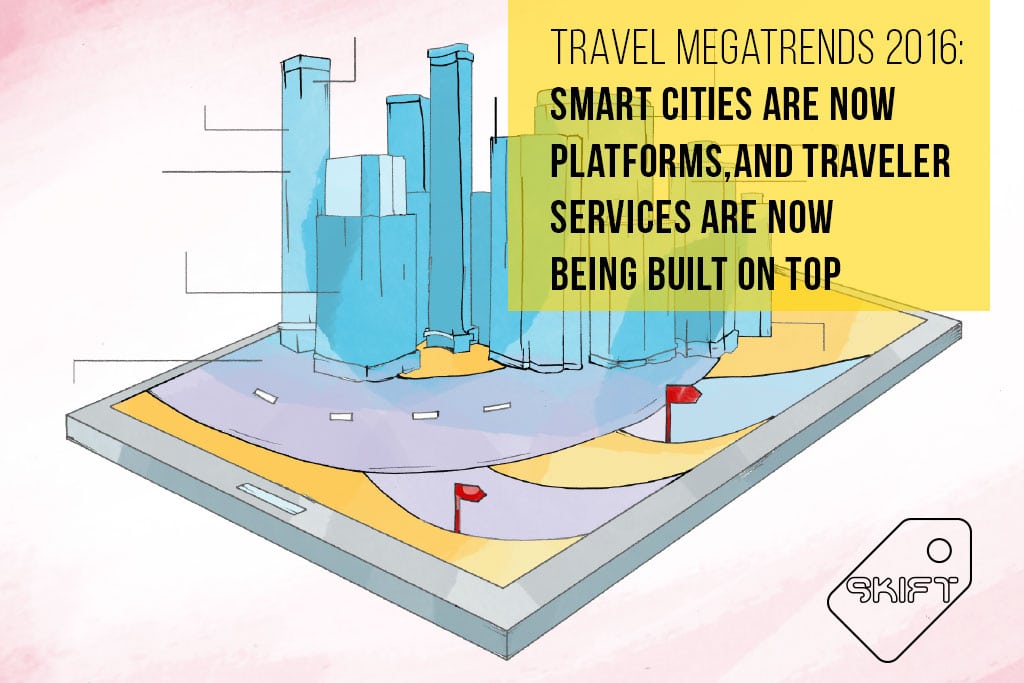Skift Take
Cities often tell us more than we know what to do with, but with the right thinking this surfeit of intelligence can be turned into an exceptional opportunity to distinguish destinations.
In January we launched our annual package, Megatrends Defining Travel in 2016, where we identified the global trends in travel in 2016 and beyond.
This will be the year when cities start leveraging their exponentially growing volume of open data to provide new services for travelers. While long anticipated, it’s only now where the “City As Platform” concept is evolving into a functional urban operating system to support the hype around smart cities.
Download the Full Megatrends Report
Internet of Things Meets the City
2016 will be the year when cities start leveraging their exponentially growing volume of open data to provide new services for travelers. While long anticipated, it’s only now where the “City As Platform” concept is evolving into a functional urban operating system to support the hype around smart cities.
The number of devices connected to the Internet of Things (IoT) is expected to grow 30 percent globally in 2016, driving $235 billion in IoT services. Those “things” are providing a lot of data, and over the last few years, many cities have launched open data platforms and new APIs (application program interface) for developers to create new apps with.
Today, existing examples of that are transportation apps like Smile, apps4BCN and MyTransport in Vienna, Barcelona and Singapore, respectively, which collect data on traffic patterns, public transportation schedules, weather and more to provide the most efficient ways in real time to get people from point A to B.
In the travel and tourism sector, Civic Resource Group developed the CivicConnect platform that collects and remasters cloud data to create smart travel apps. In December, the Fort Lauderdale Downtown Development Authority and Palm Springs Bureau of Tourism both launched new city apps with augmented reality (AR) functionality developed by Civic Resource. The IT company is also developing similar platforms for Luxembourg and Dublin. See the Skift story here.
Looking ahead, the Melbourne Data platform in Australia is showcasing the next generation of services for different sectors, including the meetings and conventions industry. The city’s data sets provide up-to-the-minute information for meeting planners on everything from bookable pop-up conference venues and special events to public art and local barbecue parties.
Or, what if someone wants data on Melbourne’s famous laneways? Yep, there’s an API for that.
In the private sector, organizations like MIT’s Senseable City Lab are developing systems that collect a city’s open data to create holistic platforms that also integrate user-generated content from the public. VisitBerlin’s new Going Local Berlin app also crowdsources information from locals and visitors, creating rich data offering insight into real world travel consumer behavior.
In effect, cities are becoming their own macro social media networks for sharing information between humans and machines. The challenge is that all of the millions of networks in thousands of cities have different APIs or they’re full of “dark data” that goes unused. They don’t speak to each other very well, which hampers the cross pollination of data and the ability for people in one community network to share information with another in a different city.
Therefore national and regional governments primarily in the U.S. and Europe are developing cooperative initiatives such as “CitySDK (software development kit)” APIs, which ensure a consistent user experience in cities that provide a CitySDK interface. As that gains adoption over time, travelers will be able to plug into different community networks without requiring a new app everywhere they go.
The Daily Newsletter
Our daily coverage of the global travel industry. Written by editors and analysts from across Skift’s brands.
Have a confidential tip for Skift? Get in touch
Tags: berlin, megatrends, melbourne, smart cities
